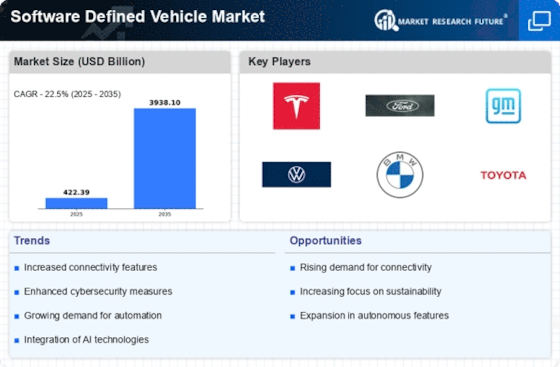Top Industry Leaders in the Software Defined Vehicle Market
*Disclaimer: List of key companies in no particular order
Top listed companies in the Software-Defined Vehicle industry are:
Robert Bosch GmbH, Nvidia Corporation, Qualcomm Technologies Inc., Marelli Holdings Co., Ltd., Continental AG, Volkswagen Group, Harman International, Tesla, Volvo Group, Ford Motor Company
The software-defined vehicle (SDV) market is revving up with intense competition. Established players and nimble startups scramble to carve their niches, employing diverse strategies in this nascent yet transformative terrain. Let's navigate the intricate dynamics of this market, analyzing key players' approaches, crucial market share determinants, and emerging trends shaping the competitive landscape.
Traditional Automakers Shift Gears: Legacy giants like GM, Ford, and Toyota are no longer just hardware experts. They're investing heavily in developing in-house software platforms and partnerships with tech giants like Google and Microsoft. GM's Ultifi platform and Ford's SYNC 4 are prime examples, aiming to provide a software-centric foundation for future vehicles. However, their entrenched hardware-focused cultures and slower innovation cycles pose challenges.
Tech Titans Make a Play: Tech giants like Google, Apple, and Baidu are eager to claim their stake in the driver's seat. Google's Android Automotive OS and Apple's CarPlay are already prevalent in infotainment systems, paving the way for deeper integration with vehicle control systems. These players benefit from their software expertise and user-centric approach, but integration with existing automotive ecosystems remains a hurdle.
Tier 1 Suppliers Adapt and Evolve: Traditional Tier 1 suppliers like Bosch, Continental, and Denso are adapting their core hardware expertise to the SDV era. They focus on developing software-defined subsystems like ADAS sensors and powertrain management systems. Partnerships with tech companies and startups are crucial for them to navigate the evolving software landscape.
Startups Disrupt the Race: Agile startups like Tesla, Rivian, and Lucid Motors are rewriting the rules. They design vehicles from the ground up with software at the core, resulting in seamless integration and rapid over-the-air updates. Their lean structures and focus on user experience offer distinct advantages, but scaling production and building brand trust remain challenges.
Market Share Determinants: Beyond the Horsepower: Analyzing market share in the SDV landscape goes beyond traditional metrics like unit sales. Key factors include:
• Software Platform Adoption: The market share of a player often translates to the adoption of their software platform across various vehicle models and brands.
• Openness and Interoperability: Open platforms that allow for third-party app development and hardware integration hold an edge over closed systems.
• Data Ownership and Monetization: Players who effectively monetize the valuable data generated by SDVs will gain a significant competitive advantage.
• Innovation and Feature Sets: Continuous innovation in areas like autonomous driving, personalization, and cybersecurity will define market leadership.
Emerging Trends: Buckle Up for the Future: Several trends are shaping the competitive landscape:
• Hyper-personalization: SDVs will learn individual driver preferences and adapt on the fly, offering a truly customized driving experience.
• Vehicle-to-everything (V2X) communication: Seamless communication between vehicles, infrastructure, and pedestrians will revolutionize safety and traffic management.
• Cloud-based services: SDVs will tap into the cloud for real-time software updates, remote diagnostics, and personalized content delivery.
• Subscription-based models: Software features and services could be offered on a subscription basis, creating recurring revenue streams for players.
The SDV market is a dynamic and unpredictable race with constantly evolving strategies and emerging players. Traditional automakers must embrace software wholeheartedly, tech giants need to bridge the hardware gap, and startups must navigate the challenges of scale. Ultimately, the winners will be those who deliver the most seamless, secure, and personalized driving experience while capturing the value of the data generated by these software-powered machines. So buckle up, the future of mobility is software-defined, and the ride promises to be thrilling.
Latest Company Updates:
Nvidia Corporation:
• Launching DRIVE Orin platform for centralized computing in ADAS and autonomous driving systems. (Source: Nvidia press release, January 2023)
Qualcomm Technologies Inc.:
• Joining Eclipse SDV Working Group and SOAFEE SIG to promote open-source platforms for SDVs. (Source: Qualcomm press release, August 2023)
Marelli Holdings Co., Ltd.:
• Collaborating with Volkswagen Group on software development for electric vehicles. (Source: Nikkei Asia, November 2023)
Continental AG:
• Developing a software-defined vehicle platform called "Automotive Edge Server" for advanced driver assistance systems and autonomous driving functions. (Source: Continental press release, June 2023)










